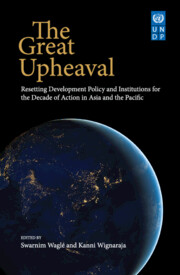Book contents
- Frontmatter
- Contents
- List of Figures
- List of Tables
- List of Boxes
- List of Appendices
- List of Abbreviations
- Foreword
- Acknowledgements
- Introduction
- 1 Aligning Sovereign Debt Financing with Climate Action in the Asia-Pacific Region
- 2 Melting Glaciers, Threatened Livelihoods: Confronting Climate Change to Save the Third Pole
- 3 Accelerating Universal Digital Connectivity
- 4 The Post-COVID-19 Future for Global Value Chains
- 5 Is Southeast Asia Falling into a Latin American–Style Middle-Income Trap?
- 6 Equality of Opportunity as a Measure of Development
- 7 Insights for Policymaking from the Multidimensional Poverty Index
- 8 COVID-19 and Human Security
- 9 Making COVID-19 Vaccine Universally Accessible
- 10 Enhancing the Provision of Global Public Goods: Ready for More Realism?
- 11 Asian-Pacific Regional Cooperation in the Post-COVID-19 Era
- 12 Pandemic Governance and Human Development: Early Lessons from Asia
- 13 Seven Lessons for Development Policy from the COVID-19 Pandemic
- About the Contributors
- Index
11 - Asian-Pacific Regional Cooperation in the Post-COVID-19 Era
Published online by Cambridge University Press: 28 February 2022
- Frontmatter
- Contents
- List of Figures
- List of Tables
- List of Boxes
- List of Appendices
- List of Abbreviations
- Foreword
- Acknowledgements
- Introduction
- 1 Aligning Sovereign Debt Financing with Climate Action in the Asia-Pacific Region
- 2 Melting Glaciers, Threatened Livelihoods: Confronting Climate Change to Save the Third Pole
- 3 Accelerating Universal Digital Connectivity
- 4 The Post-COVID-19 Future for Global Value Chains
- 5 Is Southeast Asia Falling into a Latin American–Style Middle-Income Trap?
- 6 Equality of Opportunity as a Measure of Development
- 7 Insights for Policymaking from the Multidimensional Poverty Index
- 8 COVID-19 and Human Security
- 9 Making COVID-19 Vaccine Universally Accessible
- 10 Enhancing the Provision of Global Public Goods: Ready for More Realism?
- 11 Asian-Pacific Regional Cooperation in the Post-COVID-19 Era
- 12 Pandemic Governance and Human Development: Early Lessons from Asia
- 13 Seven Lessons for Development Policy from the COVID-19 Pandemic
- About the Contributors
- Index
Summary
INTRODUCTION
The international development agenda went on hold as countries responded to COVID-19 in 2020. The pandemic has not yet subsided as of this writing (Spring 2021), and the collateral damage may linger for years to come. Yet the COVID- 19 crisis poses both a threat and an opportunity. Regional cooperation in the post-COVID-19 era should rise to that dual challenge, helping countries to seize opportunities to advance the United Nations Sustainable Development Goals (SDGs), and to devise new ways to respond to future threats.
Regionalism is a core strength of the Asia-Pacific Region (APR). Regional trade, investment and technology flows have spurred rapid economic growth and development for decades. Even in crisis, regionalism has helped shape recovery. For example, the Chiang Mai Initiative established currency swap arrangements among countries to balance payments difficulties in the 1997 Asian financial crisis. Additionally, the vulnerability of the APR to natural disasters prompted a regional response that led to a global framework for risk reduction (UN, 2015). Such examples show that regional cooperation can and should play a leading role in the post-COVID-19 era.
Moreover, the five pillars of the United Nations Framework for COVID Response envision a set of priorities requiring regional policy frameworks – one that dovetails with efforts to achieve the SDGs. Various mechanisms to achieve this already exist, as this chapter will describe, but some remain underutilized or will require the development of country- and region-level capabilities. As we will see, both pandemic response and robust, sustainable recovery require consensus about regional public goods, with health, social safety nets, financial support and digitalization informing pathways for collaboration and integration.
This chapter outlines the agenda for a post-COVID-19 regionalism. The first section recaps the initial country responses to contain the pandemic. Their largely reactive character impeded regional cooperation and limited national implementation. These containment measures require a safe but speedy unwinding for a robust regionwide economic recovery. The second section reviews the regional effort to support recovery. The various subregional responses currently underway call for sharing, harmonization and scaling-up, with technical and financial support, into a larger policy framework.
- Type
- Chapter
- Information
- The Great UpheavalResetting Development Policy and Institutions in the Asia-Pacific, pp. 299 - 323Publisher: Cambridge University PressPrint publication year: 2022



